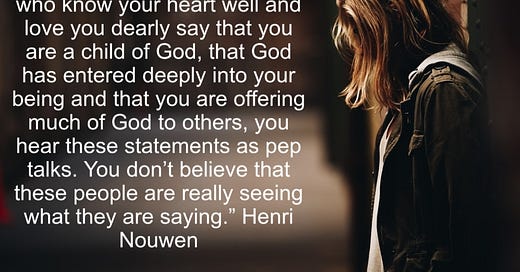Healing from a Toxic PhD Program
Thank you to Megan Westra for the summer book study on Henri J.M Nouwen’s, The Inner Voice of Love. For the next few weeks I will be sharing my reflections based on the reading.
“You continue struggling to see your own truth. When people who know our heart well and love you dearly say that you are a child of God, that God has entered deeply into your being and that you are offering much of God to others, you hear these statements as pep talks. You don’t believe that these people are really seeing what they are saying.” Henri Nouwen
As the days turn to weeks and the weeks into months, I am slowly picking up the pieces of my life (well, as much as I can in the midst of a pandemic). My whole life and self-worth were tied to academia. Before entering a PhD program, my professors had been my biggest cheerleaders. When I was convinced of my hopelessness and felt unworthy of love, it was my professors that reassured me that I had something worthwhile to say. After growing up in an emotionally neglectful and abusive home environment, plus raised in a religious tradition that often harped on and on about how horrible and deserving of hell we humans were, I needed people to reassure me that I was a person worthwhile of love. I needed people to let me know that even though I can be difficult, I was not a burden.
For decades my self-esteem has been so low, that I found myself consistently believing the worst of myself. I think this partly explains why I was so devastated after a professor in my PhD program berated me. Even as I slowly move on, I still hear parts of their criticisms towards me replaying over and over again. They had nothing good to say and any kind words offered by other professors in my program who supported and actually cared for me, fell to the wayside. Why? Because this professor was saying out loud things I had always told myself.
If I had a stronger sense of my own self-worth, I could have immediately noticed that while some of the criticisms about my behavior were valid, that other criticisms was meant to break me in order to silence me and prevent me from speaking out about the prevalent racism in academia. In other words, I would have been able to interpret their words less as a personal condemnation and more as a manifestation of the structural racism in academia in which tenured professors, including professors of color, seek to silence Black and Brown students for asserting that our lives and our voices matter.
Moreover, if I had a stronger sense of self-worth, I could have turned to other professors that cared about me and who, while acknowledging I was not in any way shape or form perfect and still had lots of areas of growth, valued my presence and who believed I had a place within academia. If I had a stronger sense of self-worth, I wouldn’t have allowed the bullying and berating I received to cause me to spiral into a deep depression where I believed my life was not worth living.
Because of the lies I repeatedly told myself about how I was not worthy of love, I took my former professor’s condemnation of who I was as the gospel truth instead of seeing these words for what they were: part of academia’s refusal to accept and embrace the humanity of Black and Brown students. Because of my own skewed understanding of myself it was easier for me to believe the words of condemnation as truth than to listen to the voices of those who repeatedly assured me that I had worth and value.
Black and Brown people in academia, in predominately white Christian settings and in popular culture, are told repeatedly that we are troublemakers, that we are too difficult, that we are whiners, that we are angry, that we are less than human. And it becomes all too easy for us to internalize these criticisms, especially when depression and other mental illnesses are added to the mix. Yes, of course, as individuals we all have areas of growth that we need to work on. But we are encouraged to hyper focus on our own individual weakness and remain silent on the systemic racism that permeates every single institution. Institutions of power seek to encourage Black and Brown people to hate ourselves in the desperate hopes of avoiding accountability for the ways in which these institutions use us and then discard us when we dare speak up. This cycle of self-loathing is meant to make us believe that we are weak and need the support of said racist institutions in order to survive and thrive.
It’s taken a few months but I’ve slowly been rejecting as false these professors’ words as well as the self-loathing that enabled me to uncritically accept their words as truth. I can acknowledge that perhaps I wasn’t the best PhD student but at the same time recognize that the institution I attended also has a history of repeatedly engaging in acts of racism and attempting to silence of Black and Brown students.
Most importantly, I am learning to acknowledge that I can be a flawed human being that needs to work on specific issues but that nonetheless I am a person worthy of love and respect.



